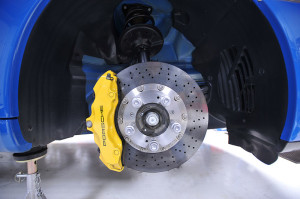Being sensitive to your car’s sounds and the way it feels and reacts when driving will allow you to detect common car brake problems early on and potentially avoid making unscheduled diversions into the roadside scenery.
Despite all the high-tech wizadry on modern cars, the brakes themselves (ignoring ABS for a moment) remain relatively low-tech – they slow down the car by tightly gripping the brake discs on the wheels in the same way as the brakes on a bicycle. No gears or engineering marvels, just simple, good old-fashioned friction.
However simplicity is not without its drawbacks, a few of which are:
Weak brakes
Since your brakes work by using friction to stop swiftly-rotating metal discs, this means every time you use them a tiny amount of the brake disk pads are worn away. Over time the pads wear down until they need replacement, and you may find yourself pushing the brake pedal harder to achieve decent braking effect. This is most often caused simply by worn brake pads, which are relatively cheap and easy to replace.
Sometimes brake pads can become ‘glazed’ for various reasons, so their surfaces become smooth and ineffective (not enough friction when applied). The pads can be de-glazed or simply replaced, but the reason for the problem should also be looked at – low quality brake pads previously installed, for example.
Weak brakes could also be caused by the hydraulic system that powers the “gripping action” of the brake pads. Low brake fluid can be topped up easily enough, but damaged brake cylinders or hoses (which probably caused any low fluid problem anyway) need professional investigation by a garage.
If you hear squealing or screeching sounds it could be the brake pads are so worn they’ve almost disintegrated and need immediate replacement. Driving around with brakes like this is a very bad idea, at the very least you can ruin the brake discs themselves causing more expense, and at worst you could find your brakes suddenly hardly work at all.
If it’s not the pads then it could be other worn or damaged brake parts, or sometimes simply it can be that the caliper pins need cleaning and greasing, a fairly minor job.
Brake judder
If your pedal or steering wheel vibrates or pulsates when you brake, take it to the garage sooner rather than later; again it could be a minor problem which if left will turn into a major one. Some common causes are:
- A damaged or incorrectly-fitted brake disc pulling out of alignment with the hub or caliper
- Dirt or rust in the brakes
- Brake discs warped or worn so that they aren’t uniformly-thick all the way round (known as “disk thickness variation” or DTV).
- Problems with the brake hydraulic system
Most new cars have warning lights on the dash that flash up if there’s anything wrong with your brakes. These are lights you don’t want to ignore! Bring your car to Triggs and we’ll check it over on our rolling road to pinpoint the problem.

